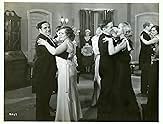A night of love, intrigue, death, and blackmail leaves a stage-star's fate at stake in a conflict with an unscrupulous doctor. A rejected lover dies in an actress' apartment, resulting in bl... Read allA night of love, intrigue, death, and blackmail leaves a stage-star's fate at stake in a conflict with an unscrupulous doctor. A rejected lover dies in an actress' apartment, resulting in blackmail.A night of love, intrigue, death, and blackmail leaves a stage-star's fate at stake in a conflict with an unscrupulous doctor. A rejected lover dies in an actress' apartment, resulting in blackmail.
- Director
- Writers
- Stars
- Director
- Writers
- All cast & crew
- Production, box office & more at IMDbPro
Featured reviews
Louis Jean Heydt's part in the film is interesting, as it was his first motion picture. And he played many parts in movies from 1933 until his death in 1960. There are a few awkward times when his performance in this movie. That is no doubt due to his inexperience.
At the time of Heydt's death, he was appearing in a production of the play There Was a Little Girl, and his co-star opposite was Jane Fonda. He died of a heart attack immediately after the first act of that play, and the performance went on by understudy William Adler.
I love the old movies dating back to this era. Who cares if it moves a little slow at times? There could be a counter-argument made that today's films move much too fast. I also agree with the observation that this one, with its engaging storyline, could be successfully remade today.
She makes some phone calls. A dead married man in her apartment is not something she wants bruited about. In comes Doctor Leo Carillo. He says it was not a heart attack, but nicotine poisoning, that he found Hicks' will in his breast pocket -- where people always keep them -- and it leaves $200,000 to Miss Baxter. He suggests that he can take the corpse to his sanitarium and report the death as a heart attack for $200,000 in cash by the next day.
This interesting written murder mystery suffers a common issue for Poverty Row dramas of the era: very stagy line readings. However, the excellence of the story and Leo Carillo makes it very worthwhile. Although Carillo is probably best remembered as Pancho on TV's CISCO KID, and frequently played with a Mexican accent, in truth he came from a wealthy Los Angeles family who could trace themselves back to the Conquistadors. His grandfather had been the first provisional governor of California, and his father the first mayor of Santa Monica. Carillo himself was a trained engineer and cartoonist. In the 1930s he excelled at playing threatening villains, although his career turned into one of more standard accent parts in the 1940s. He died in 1961 at the age of 80.
It came as no surprise that "Before Morning" had been a stage play first, because it's acted as if it's still one, with over-the-top dramatization and lines being spoken as if the folks in the rear balcony have to be heard. Also, the storyline (death, cover-up, blackmail, deception, secret identity, etc.) would work well on stage, but somehow didn't work so well on film.
It was a nice try, though.
An actress is planning on getting married and she tells a male friend about this. The man isn't feeling very good and goes to her bedroom to lie down. Soon, however, she finds the friend is dead and she is worried what the man's wife will think. Nothing happened unseemly, but she's worried about the appearance of impropriety. One of her friends recommends they call a trusted doctor (Leo Carillo). Unfortunately, this plan is not a good one, as the doctor is evil and uses this as an opportunity to shake down the actress as well as the man's wife!
As I said, the idea was interesting...the execution was clunky and dull. I blame the director for this...as the pacing and acting are his responsibility. It also didn't help that the big twist came long before the movie ended and the film kept dragging on and on afterwards.
Did you know
- TriviaA print of this film survives in the UCLA Film and Television Archives.
- Quotes
James Nichols: Of course, it was a shock, coming in here and seeing... a thing like that, and realizing... even that somehow, well, it hasn't changed me.
Details
- Runtime
- 56m
- Color
- Aspect ratio
- 1.37 : 1




















